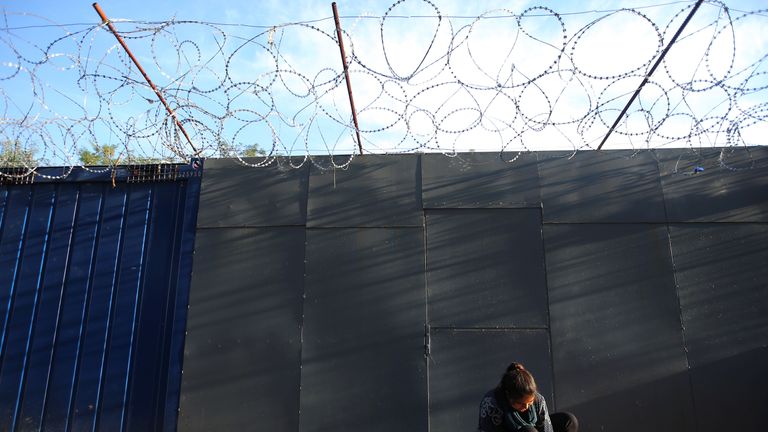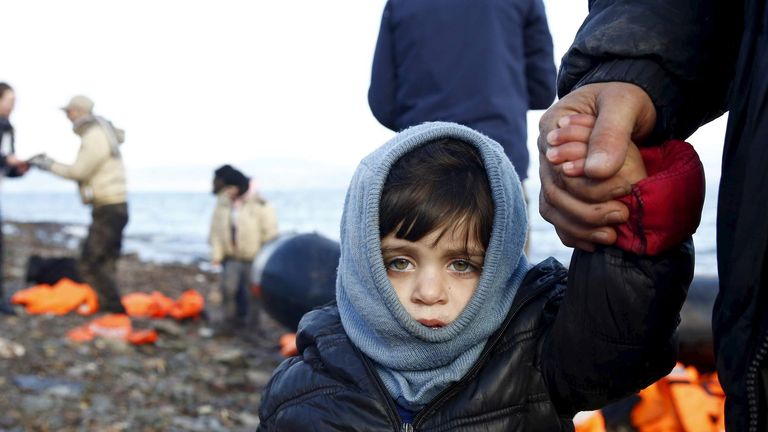Ukraine war: Stark difference in Eastern Europe's welcome to Ukrainian and Syrian refugees is troubling
In Eastern Europe, the border guards and police who are today handing out food to Ukrainians are the same force who were pushing refugees from the Middle East back across their frontiers.聽
Tuesday 22 March 2022 07:01, UK
I'm just leaving Eastern Europe after a week covering the refugee crisis caused by the war in Ukraine - and here are a few reflections from beyond the headlines.聽
I've witnessed some hugely uplifting moments of love and generosity, but I've also seen such fear of what might be to come.
There have been hints too of some really troubling aspects of this crazy time we're living through.
Ukraine war live updates: Russia-US relations 'on brink of collapse'
Nervousness in Eastern Europe
Something our local producer said to me over dinner last night rings loud in my ear.
The gist of it was this: "I'm going to live a fuller life… because who knows what might happen next."
Of all the consequences of Russia's invasion of Ukraine, one is that people in Eastern Europe have been spooked.
Since the fall of the Iron Curtain in 1989, eastern Europeans have increasingly, and understandably, taken their freedom and democracy for granted.
From Poland to Romania and from Latvia to Estonia, they have achieved so much since they secured their freedom from the Soviet Union.
Watching their neighbour losing that freedom so brutally and swiftly has alarmed them.
Never mind the protections offered by NATO membership. The events of the past month have focussed minds among politicians and people alike.
Read more:
• The Ukrainian refugees who already want to go back home
• Human traffickers prey on Ukrainians fleeing Russian invasion
A raw history
I write this from Przemysl, a beautiful little town in eastern Poland.
In 1939, as the Nazis swept through Poland in an invasion which precipitated the Second World War, the Battle of Przemysl was one of the early attempts to defend freedom from tyranny.
For three days, the townsfolk held back the Nazi forces. But their defence eventually broke.
In a sign of the horror that was to come, the Jewish population was singled out. More than 500 Jews were murdered in and around Przemysl in those early days.
Over the subsequent few years, thousands more from Przemysl, some of whom were already refugees from other towns, were taken to Auschwitz or to the Janowska concentration camp near Lviv in modern day Ukraine.
Eighty-three years on and the people of Przemysl are showing such generosity to Ukraine's refugees (many of them Jews) as history threatens, in eerily similar ways, to repeat itself.
The history is raw here. It prompts generosity, but also introspection about how fragile peace actually is.
Who's welcome and who's not?
There is another thing that's been really troubling me. It's controversial and impossible to ignore.
Ukrainians are being welcomed into homes across Europe; so much so that there isn't, visually, that much evidence of a refugee crisis.
It's not like 2016 when refugees, far fewer in number, were fleeing to Europe from the conflict in Syria.
I watched back then as columns of people trudged across Europe, pushed back at every turn on the orders of governments. Only Germany was welcoming. "We can do it," then-chancellor Angela Merkel had famously said.
But in Eastern Europe, the border guards and police who are today handing out food to Ukrainians are the same forces who were pushing Middle Eastern refugees back across their frontiers. In fact, they were doing it just last year on the Belarusian-Polish border.
This seems to be the blunt reality: people from Ukraine are welcome, people from far-away lands like Syria, whose culture and religion is perceived to be very different, have found themselves far less welcome.
Of course, the demographics play a part. Most Ukrainian refugees are women and children. In 2016 there were many more young men (so often escaping Syrian conscription and travelling ahead, paving a way for more vulnerable women and children).
Still - the difference in the welcome is striking.
And here's the irony: the Syrians and the Ukrainians flee the same aggressor.
In Syria's 11-year-long war, it has been Russia helping the Syrian regime flatten cities like Aleppo and Homs into submission, just as they are doing now in places like Mariupol and Kharkiv.






